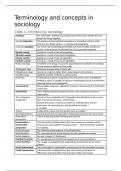Terminology and concepts in
sociology
Class 1: Introducing sociology
Sociology The systematic, sceptical and critical study of the social. Studies the way
people do things together.
(social) integration The process of incorporating newcomers or minorities into the social
structure of a (host) society. => cohesion and integration
(cultural) regulation The set of rules identifying permissible and impermissible activities in
society. Cultural desires (unlimited) are to be externally regulated.
Egoistic suicide Suicide as a result of lack of integration.
Altruistic suicide Suicide as a result of too much integration.
Anomic suicide Suicide as a result of lack of regulation.
Fatalistic suicide Suicide as a result of too much regulation.
Public sociology A subfield of sociology, focused on expanding the boundaries of sociology
to non-academic audiences; the public.
Theological stage Society as an expression of God’s will.
Metaphysical stage Society as a natural, rather than a supernatural, phenomenon.
Scientific stage Applying scientific methods to study society.
Positivism A philosophical system recognizing only that which can be scientifically
verified or which is capable of logical or mathematical proof, and therefore
rejecting theism and metaphysics.
Gemeinschaft Social relations between individuals, based on close personal or family ties;
community.
Gesellschaft Social relations based on impersonal ties, such as duty to a society or
organisation.
The sociological Society as the combination of 1) biography (the individual events in one’s
imagination life), 2) social environment, and 3) history.
Explains the power of society to shape our individual lives and the
importance of connecting our individual lives to society. ?
C. W. Mills
Theory A statement of how and why specific facts are related
Sociological theory General framework of explanation linking phenomena in the social world.
Theoretical A basic image that guides thinking and research
perspective
Functionalism / A framework for building theory that sees society as a complex system
functionalist whose parts work together and interconnect – often to promote solidarity
perspective and stability.
Social structure The relatively stable patterns of social behaviour.
Social function The consequences of social structure for the operation of society.
Social solidarity Zie later: chapter 4? (Durkheim)
Manifest functions The recognised and intended consequences of any social pattern.
Latent functions The largely unrecognised and unintended consequences of any social
pattern.
Social dysfunctions Any social pattern’s undesirable consequences for the operation of society.
Conflict perspective A framework for building theory that sees society as an arena of
differences and inequalities that generate conflict and change.
,Social actions Society as a shared reality that its members construct as they interact with
perspective one another?
ZIE symbolic interationism
Macro-level A focus on broad social structures that characterise society as a whole.
orientation More fact based?
Micro-level A focus on the emerging meanings of social interaction in specific
orientation situations.
Integration The action of process of integrating.
Integrating: bringing (people or groups with particular characteristics or
needs) into equal participation in or membership of a social group or
institution
Socialising The process of learning how to behave in a way that is acceptable to
society.
Symbolic A theoretical framework that envisages society as the product of the
interactionism everyday interactions of people doing things together.
Dramaturgical We resemble actors on a stage as we play out our various roles before
analysis others.
Social exchange Social interaction amounts to a negotiation in which individuals are guided
analysis by what they stand to gain and lose from others.
Class 2: Societies
Society People who interact in a defined space and share a certain social
organizational structure and culture.
Capitalism The economic system in which resources and the means of producing
goods and services are privately owned.
Private ownership of property
Pursuit of personal profit
Free competition, consumer sovereignty and markets
Neoliberal market Highly competitive, decentralised, open markets, anti-trust and union,
capitalism freest flow of capital markets, minimal state involvement and planning,
(Reaganism, maximising of returns to owners of capital. Champions free individual.
Thatcherism) Uncritical of fostering of mass poverty and injustice.
Multi-paradigmatic Sociology is not one position but many.
Society People who interact in a defined space and share culture.
Sociocultural The process of change that results from a society’s gaining new
evolution information, particularly technology.
Hunting and Simple technology for hunting animals and gathering vegetation.
gathering
Rudimentary Involving or limited to basic principles.
Stratification The arrangement or classification of something into different groups.
Indigenous peoples Peoples with ties to the land, water and wildlife of their ancestral domain.
Horticulture Technology based on using hand tools to cultivate plants.
Pastoralism Technology based on the domestication of animals.
Material surplus More resources than are necessary to sustain day-to-day living.
Agriculture The technology of large-scale farming using ploughs harnessed to animals
or more powerful sources of energy.
Barter The act of trading goods or services between 2 or more parties without the
use of money.
Industrialism Technology that powers sophisticated machinery with advanced sources of
energy.
,Industrial revolution Flowing water and steam; mills and factories; larger and more efficient
machinery.
Information Computers and the internet
revolution
Post-industrialism Computer-linked technology that supports an information-based society.
Information society
Network society
Cyber-society
Postmodern society
Postmodernism The ways of thinking which stress a plurality of perspectives as opposed to
a united, single core.
Social conflict The struggle between segments of society over valued resources.
Many forms: on individual level, between towns, etc.
Marx: clashed between social classes that arise from the way a society
produces material goods
Capitalists People who own factories and other productive enterprises. Goal = profit
(Marx)
Proletariat People who provide labour necessary to operate factories and other
productive enterprises. (Marx)
Social institutions The major spheres of social life, or society’s subsystems, organised to meet
basic human needs.
(historical) How humans produce material goods shapes the rest of society.
Materialism
Social infrastructure Base, foundation of society (Marx: economic systems)
Superstructure Systems built on the foundation of society (Marx: every social institution
other than the economic system: family, political system, religion, etc.)
False consciousness Explanations of social problems grounded in the shortcomings of
(↔ class consc.) individuals rather than the flaws of society. Victimising people, while
industrial capitalism is responsible for their problems. (Marx)
Communism A social system in which the production of food and other material goods is
a common effort shared more or less equally by all members of society.
(Marx)
Feudalism A system in which people were given land and protection by people of
(feodalisme) higher rank, and worked and fought for them in return.
Exploitation, veiled by religious and political illusions, according to Marx.
Bourgeoisie A new social category (in the Middle Ages), consisting of merchants and
skilled crafts workers. During the industrialisation, they became true
capitalists. (Marx)
Dialectics The art of investigating or discussing the truth of opinions.
Class conflict (class Antagonism between entire classes over the distribution of wealth and
struggle) power in society. (Marx)
Capitalist society: out into the open, out of ‘naked self-interest’ and the
pursuit of profit (in a blatant exercise of oppression)
Subsistence The action or fact of maintaining or supporting oneself, especially at
minimal level.
Class consciousness The recognition by workers of their unity as a class in oppression to
(↔ false consc.) capitalists and, ultimately, to capitalism itself. (Marx)
Alienation The experience of isolation resulting from powerlessness. (Marx)
Socialism A more humane and egalitarian productive system, that enhances rather
than undermines social ties. ↔ capitalism (Marx)
Ideal type (Weber) A mental construct, like a model, for the scrutiny and systematic
, characterisation of a concrete situation. (deliberate simplification or
exaggeration)
Tradition Sentiments and beliefs passed from generation to generation. (Weber)
Rationality Deliberate, matter-of-fat calculation of the most efficient means to
accomplish a particular goal. (Weber)
Rationalisation of The historical change from tradition to rationality as the dominant mode of
society human thought. (Weber)
Predestination The idea that an all-knowing and all-powerful God has preordained some
people for salvation and others for damnation. (Calvinism)
Work ethic
Bureaucracy Zie later!! The model for modern businesses, government agencies, trade
unions and universities. Weber: the clearest form of rational world-view
because its chief elements – offices, duties and policies – are intended to
achieve specific goals as efficiently as possible.
Anomie A condition in which society provides little moral guidance to individuals.
(Durkheim)
Collective conscience A shared way of understanding and behaving in the world (norms, beliefs
and values), so strong that the community moves quickly to punish anyone
who dares to challenge the conventional ways of life. (Durkheim)
Mechanical Social bonds, based on shared morality, that unite members of pre-
solidarity industrial societies. Springs from likeness. (Durkheim)
Organic solidarity Social bonds, based on specialisation, that unite members of industrial
societies. Springs from differences. (Durkheim)
Division of labour Specialised economic activity.
Moral consensus + collective conscience
Functional ~functionalism: interdependent subsystems
interdependence
Durkheim’s dilemma The technological power and expansive personal freedom of modern
society come only at the cost of receding morality and the ever-present
danger of anomie.
Theoretical
suggestions about
society:
Post-industrial Society as a productive system based on service work and high technology.
society (Bell)
Post-history society Society has reached its historical end point in the worldwide triumph of
liberal capitalism, in the wake of the collapse of communism. (Fukuyama)
Postmodern society Society that recognises that the traditional, modern and postmodern
worlds all live alongside each other? Direct challenge to Enlightenment
thinking and modernity?
Late modernity Late modern society as an intensification and speeding up of themes well
developed in modern society. No break with the past modern world.
(Giddens, Harvey, Habermas)
Reflexive modernity A society in which people become more aware (reflexive) about what is
going on around them.
Multiple modernities There are many past routes into the present world and many forms that
contemporary modernity can take. (Eisenstadt)
Liquid society New society is more fluid than previous ones. Everything changes,
everything flows, mobility is key. Uncertainty (Bauman) and global flow and
complexity (Urry).
Late capitalism Society is which Marx’ concerns about capitalism are amplified and





